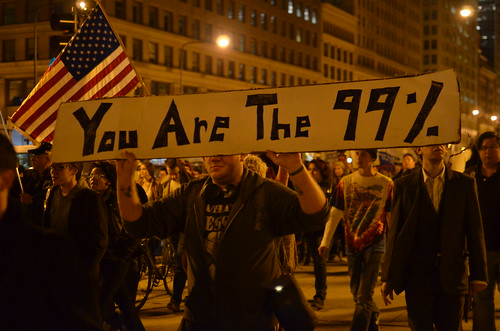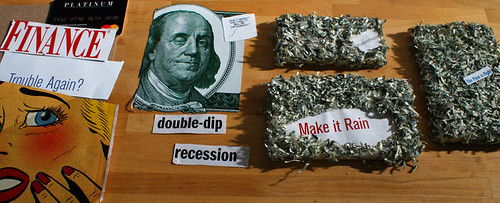What happens to a dream deferred?
Does it dry up
Like a raisin in the sun?
Or fester like a sore-
And then run?
Does it stink like rotten meat?
Or crust and sugar over-
Like a syrupy sweet?
Maybe it just sags
Like a heavy load.
Or does it explode?
"Harlem" by Langston Hughes
Our lost generation, having graduated into a
lost decade, has finally found its purpose and its voice. I don't know what took us all so long. For too long discussions of the issues we were struggling with were atomized into too many far corners and niches of the Internet, from the boards at
Quarterlife Crisis to the
varied Facebook groups of the student loan justice movement. Finally, in cities across America and even across the globe, we have converged upon public spaces to call attention to the issues that matter so much to us.
I have written off and on about these issues here on this blog. I have detailed my
frustration with the economy, my disgust with the licensing laws governing the field of
interior design, and
my battle with my arch nemesis, Sallie Mae. I have also written on my other blog about
what it was like to work in a store that was going out of business due to corporate greed, as well as
how it felt to be mal-employed in retail. I have graduated into three recessions and/or job market downturns, first in 2001, then in 2006, and finally in 2009. There is evidence that
those who graduate in recessions earn less over their lifetimes than those who do not. That certainly has been the case for me so far. I am finally earning the kind of money I'd hoped to make 10 years ago, but can't really enjoy it because most of it goes toward servicing debts I racked up when I was broke.
None of my degrees have paid off for me financially. Many of my friends' degrees haven't paid off, either. Sure, some of them were humanities majors. A few are writers who lost jobs in print media or never got to work for a magazine or publishing company in the first place. Some people would chide them for not studying something in the sciences or technology. With them, I'd like to share the sad tale of my fiance, who after 10 years of rejection and mal-employment, had no other choice but to go back to graduate school to make himself more employable in his field, which is engineering. Still, he is better off than this
electrical engineer with multiple advanced degrees who is now homeless. So much for the STEM careers being the magic bullet to fix everything.
The system that so many of us were taught to work within is not working anymore. As kids we were told by our parents, teachers, and even
celebrities in public service announcements to work hard, stay in school, and go to college. Borrowing for college meant taking on "good debt." Going to college was supposed to be the price you paid to get a good job. But many of the good jobs are gone, or have too many applicants and not enough openings. A lot of the good jobs were lost in the recession, and the
new ones that have been created in its wake do not pay well. (Thanks, job creators!) So many new graduates can attest to that, as can those facing unemployment in this crappy job market. And
people of color were hit hardest by the recession. And things still haven't gotten much better.
I'm thankful to have a job at a time like this. My job is like a lifeboat in an ocean full of sinking ships. As the great catastrophe of joblessness spreads across industries, it seems like no field is safe. At first I lamented the dearth of interior design jobs and later I berated myself for not choosing something "safer." By now the "safe" jobs in the public sector aren't even safe anymore. And I recently read that even on Wall Street
they might be laying people off soon. Who can say how long it will be before my own "lifeboat" springs a leak?
Unfortunately, this level of empathy has too often been lacking in the discourse about unemployment, mal-employment, and debt online. I have read countless stories and message board posts that drew hateful comments from smug people who brag about how they made all the right decisions who ask why they should be obligated to help others who are less fortunate. After all, if you can't find a job in this supposed land of opportunity,
it's all your fault. And can we really call impoverished Americans poor if they have
a refrigerator and a TV at home? They deny the reality that
things have gotten much worse for the poor in this country since the recession began and would accuse them of being lazy and looking for a handout.
Now I don't want to generalize and paint all the people who work in finance or for large corporations with the same broad brush. There are so many good, decent, kind, generous individuals working for large corporations and on Wall Street and in Chicago's financial district. I don't think it's fair to characterize all the people who work in a particular industry as villains. Sometimes good people work for a bad system. Take it from me, I used to sell carpet.
But with some of these corporations, as with carpet retailers, what's problematic is the system the industry works within. I understand that corporations need to make a profit, but when
banks charge people to use their own money, I have a problem with that. When they f
oreclose on homes without getting all the facts straight first, I have a problem with that. And what about loans? It's one thing to owe and pay interest on a reasonable sum of borrowed money, and another for the debt to become a form of modern-day indentured servitude. That's why people are protesting
the student loan lending system, which currently does not allow protections like bankruptcy or even--in the case of private loans--refinancing. So many who have borrowed money for higher education in the years since the rules on student loan lending were changed are crushed by the burden of their debts.
Some have fled the country while others have been
driven to suicide.
With all the frustration and despair that has beset the foreclosed-upon, the downwardly mobile, the long-term unemployed and the mal-employed, the only thing I find surprising about this movement is that it took so long to actually happen. That some politicians are "surprised" by its rapid spread just shows how out of touch they are with their constituents and the real issues they face. Many names for this movement have been circulating, with the general consensus being
The American Awakening. But I think American Autumn is also quite fitting. In autumn the leaves turn brilliant shades of gold, orange, and red. But these colors were there all along, though the chlorophyll the trees produced in the spring and summer made their dominant color green. This movement is like the color of the leaves. Things that were once hidden are now vibrantly displayed.
I find myself inspired to work on some new Recessionist pieces.
I'm going to have a lot of fun with that winking Ben Franklin. The caption next to him reads, "This time will be different!"
Yeah, we'll see.
In the meantime, a few of my favorite articles on the subject:
Roger Ebert,
"The One Percenters" (written several months ago, actually)
Jim Forbes,
"Occupy Wall Street will not come to our utopia"
Alisha L. Gordon,
"Occupy Any Street: The Deferment of the American Dream"
Barbara Ehrenreich,
"The Guys in the 1% Brought This On"
David Sirota,
"Pitying billionaires as America starves"
Mike Konczal,
"What do the '1 percent' actually do?"
Charlotte Hill and Robert Fuller,
"Occupy Wall Street and the Promise of Dignity"
Jay Smooth,
"Outing the Ringers"



















































